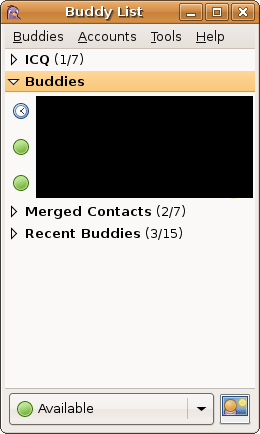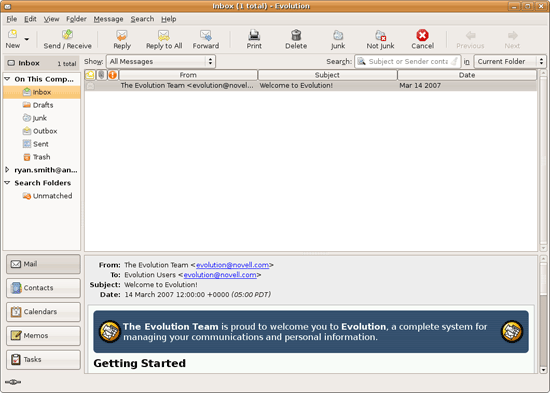Revisiting Linux Part 1: A Look at Ubuntu 8.04
by Ryan Smith on August 26, 2009 12:00 AM EST- Posted in
- Linux
Applications: Communication - Email & Instant Messaging
Windows Default: Windows Mail/Outlook
What I Use: Outlook
Ubuntu Default: Evolution
Separate communication suites are a bit of a dying breed these days, largely due to the aforementioned rise of the web browser. Thanks to services like Gmail, web based email has taken a massive dent out of the need to use an email client, and new services are popping up that are starting to do the same for instant messaging. But they’re not dead yet, and more importantly I’m too old fashioned to give up my dedicated email and instant messaging clients, so this is a matter I consider important.
The default email client on Ubuntu is Evolution, a clone of Outlook. As Outlook is my default email client under Windows anyhow, this worked out quite well for me. Because Evolution is an Outlook clone, it features not just email, but contact lists and calendaring too, supplanting the need for separate applications for those under Ubuntu.
At the same time, because Evolution is an Ubuntu clone, there’s not a lot I can say about it – it’s a clone, there’s not much unique to it. What it is however is a good clone when it comes to my needs. Credit is due where deserved in cloning the monster that is Outlook, because Evolution did email, contacts, and calendaring for me just as well as Outlook does.
The only notable issue I had with Evolution is that it does not have a way to import Outlook PST files. It’s possible to do it, but it involves using Mozilla’s Thunderbird email client as an import/export mechanism. To be clear I’m not faulting Evolution here since PST is a closed Microsoft format.
Users coming from Windows Mail will be a bit less at home, but at the same time Evolution is likely an improvement for them for all the same reasons that Outlook is a better client than (and the de-facto Windows email client in place of) Windows Mail. Perhaps a more direct benefit is that since Evolution is pre-installed with the base OS installation, you don’t need to go hunt down a real email application after the OS installation. Never underestimate the annoyance of having to install more software.
If this description seems short, it’s not for the lack of effort or a dislike of Evolution. In fact I’m plenty happy with it, but as I use it it’s just Outlook with a different GUI. So far as I’m concerned this is a good - if unexciting – thing when coming from Windows and Microsoft Office.
Final Verdict: Meets My Needs
Windows Default: None/Windows Live Messenger
What I use: Trillian
Ubuntu Default: Pidgin
Somewhere along the way to Vista, Microsoft decided to decouple some applications from the OS, MSN Messenger was one of them. As a result Vista does not come with an instant messaging client of any kind, rather it comes with a link to go download the latest version of Windows Live Messenger. Not that it would necessarily be of much use, the last time I saw any statistics for instant messaging network usage, the vast majority of North American users were on AOL’s AIM network. In this case Windows may as well not have an official instant messaging client, because unless you use the MSN network (or Yahoo network) there’s no practical difference.
So it’s a nice change of pace when we note that Ubuntu comes with a multi-protocol instant messaging client as part of the base OS install. Pidgin (née GAIM) supports AIM, Yahoo, ICQ, MSN, and a boatload of smaller networks, thoroughly eliminating any possible problem of not being able to connect to your network of choice. Like Firefox, Pidgin is another significant multi-platform application, and is found on Windows and Mac OS X too.

Moving on to features, Pidgin hits all of the checkboxes as far as requisite features are concerned. Buddy lists, chat logging, file transfers, emoticons, end-to-end encryption, etc are all supported. What helps to set Pidgin apart from other clients, and this one again drawing a parallel to Firefox, is its support for plugins. Plugins aren’t new as far as instant messaging clients are concerned, but many clients don’t support them.
Pidgin comes with 30 such plugins, ranging from tools to integrate Pidgin with Evolution, to adding support for mouse gestures. Some of these are standard features in other IM clients, so clearly not all 30 plugins are by any means unique. I’m also going to throw built-in spell-checking in this category – not new, but sorely missed from a lot of clients.
Coming from Trillian, Pidgin is effectively a drop-in replacement. The two don’t have feature parity (Trillian has more features, specifically audio/visual chatting) but as far as I use either client, I don’t use anything that makes the two notably different once a few plugins are installed. Much like Evolution there’s undoubtedly some missing features once you get deeper that would be of concern to the hardcore users, but it’s nothing that rears its head for me.
Final Verdict: Meets My Needs











195 Comments
View All Comments
ioannis - Wednesday, August 26, 2009 - link
...sorry, I think it's Alt+F2 by default. I'm talking about the 'Run Command' dialog.Eeqmcsq - Wednesday, August 26, 2009 - link
Oh, yes you're right. I stand corrected.sprockkets - Wednesday, August 26, 2009 - link
Ubuntu doesn't ship with the firewall on eh? Weird. SuSE's is on, and that has been the default for quite some time. GUI management of it is easy too.clarkn0va - Wednesday, August 26, 2009 - link
For incoming connections I don't quite grasp what good a firewall will do on a system with no internet-facing services. With no open ports you stand little to gain from adding a firewall, and any internet-facing service you might add, well, you don't want to firewall that anyway.I can see two theoretically plausible arguments for a host-based firewall, but even these don't really stand up in real-world use: 1) a machine that has open ports out of the box (I'm looking at you, Windows), and 2) for the folks who want to police outgoing connections.
In the case of the former, why would we open ports and then block them with a firewall, right out of the box? This makes as much sense to me as MS marketing their own antivirus. Third-party firewalls were rightfully introduced to remedy the silly situation of computers listening on networks where they shouldn't be, but the idea of MS producing a host-based firewall instead of just cleaning up their services profile defies common sense.
In the case of outbound firewalling, I've yet to meet a home user that understood his/her outbound firewall and managed it half-way effectively. Good in theory, usually worse than useless in practice.
db
VaultDweller - Wednesday, August 26, 2009 - link
Just because a port/service is open, doesn't mean you want it open to the whole world.Examples:
SMB
NFS
VNC
RDP
SSH
Web (intranet sites, for example)
And the list could go on... and on and on and on, really.
Also, it's erroneous to assume that only 1st party software will want to open ports.
And that is to say nothing of the possibility of ports being unintentionally opened by rogue software, poorly documented software, naughty admins, or clumsy admins.
Host-based firewalls help with all of these situations.
clarkn0va - Wednesday, August 26, 2009 - link
Windows firewall doesn't filter by source. In other words, if you want SMB or any other service open to some peers and not others, Windows firewall can't help you; you'll need a more sophisticated product or a hardware firewall for that.I'm not saying there's no case for host-based firewalls, I'm just saying it's pointless for most users out of the box, where Ubuntu doesn't need it and Windows should be looking at fixing the problem of unneeded services running, rather than just bolting on another fix.
VaultDweller - Wednesday, August 26, 2009 - link
"I can see two theoretically plausible arguments for a host-based firewall, but even these don't really stand up in real-world use"That sounds to me like a claim that there is little or no case for a host-based firewall; at least, that's how I interpreted it.
"Windows firewall doesn't filter by source. In other words, if you want SMB or any other service open to some peers and not others, Windows firewall can't help you"
That is incorrect, and you should check your facts before making such statements. The Windows Firewall can filter by source. Any firewall exception that is created can be made to apply to all sources, to the local subnet only, or to a custom list of IPs and subnets.
The firewall in Vista and Windows 7 goes a step further, as it is location aware. Different ports and services are opened depending on the network you're plugged into, as exemplified by the default behavior of treating all new networks as "Public" (unknown and untrusted) until instructed otherwise.
clarkn0va - Wednesday, August 26, 2009 - link
"The Windows Firewall can filter by source. Any firewall exception that is created can be made to apply to all sources, to the local subnet only, or to a custom list of IPs and subnets. "In that case I retract my assertion that an out-of-the-box firewall makes no sense in the case of Windows.
As for Ubuntu, or any other desktop OS having no open ports by default, I still see including an enabled firewall by default as superfluous. Meanwhile, firewall GUIs exist for those wishing to add them.
Paazel - Wednesday, August 26, 2009 - link
...not enough pictures. admittedly my interest additionally waned when i read the newest ubuntu isn't be reviewed.philosofool - Wednesday, August 26, 2009 - link
I'm not done with this article, which I'm loving. However, there's a grammatical/spelling quibble that's driving me nuts: "nevertheless" is one world.